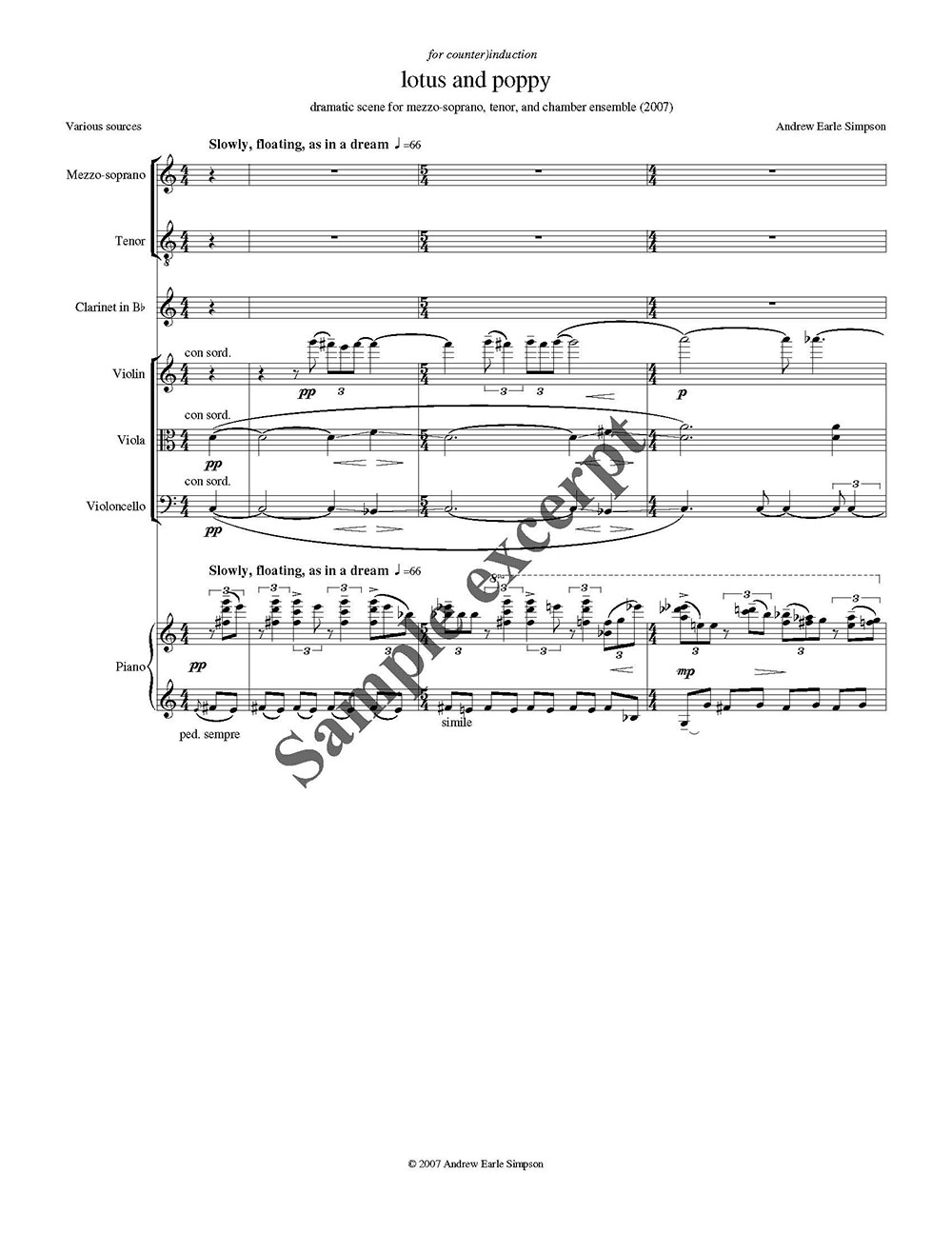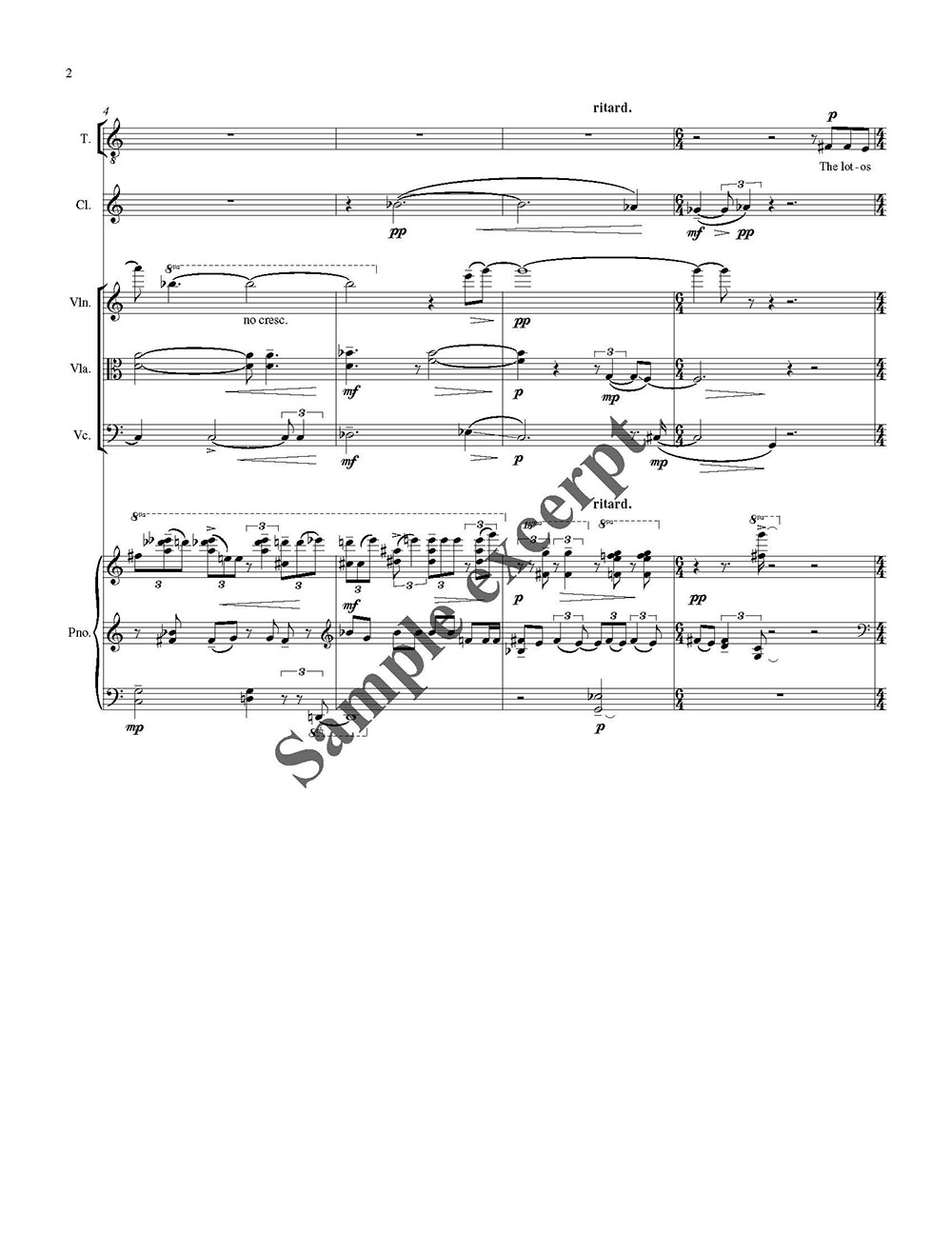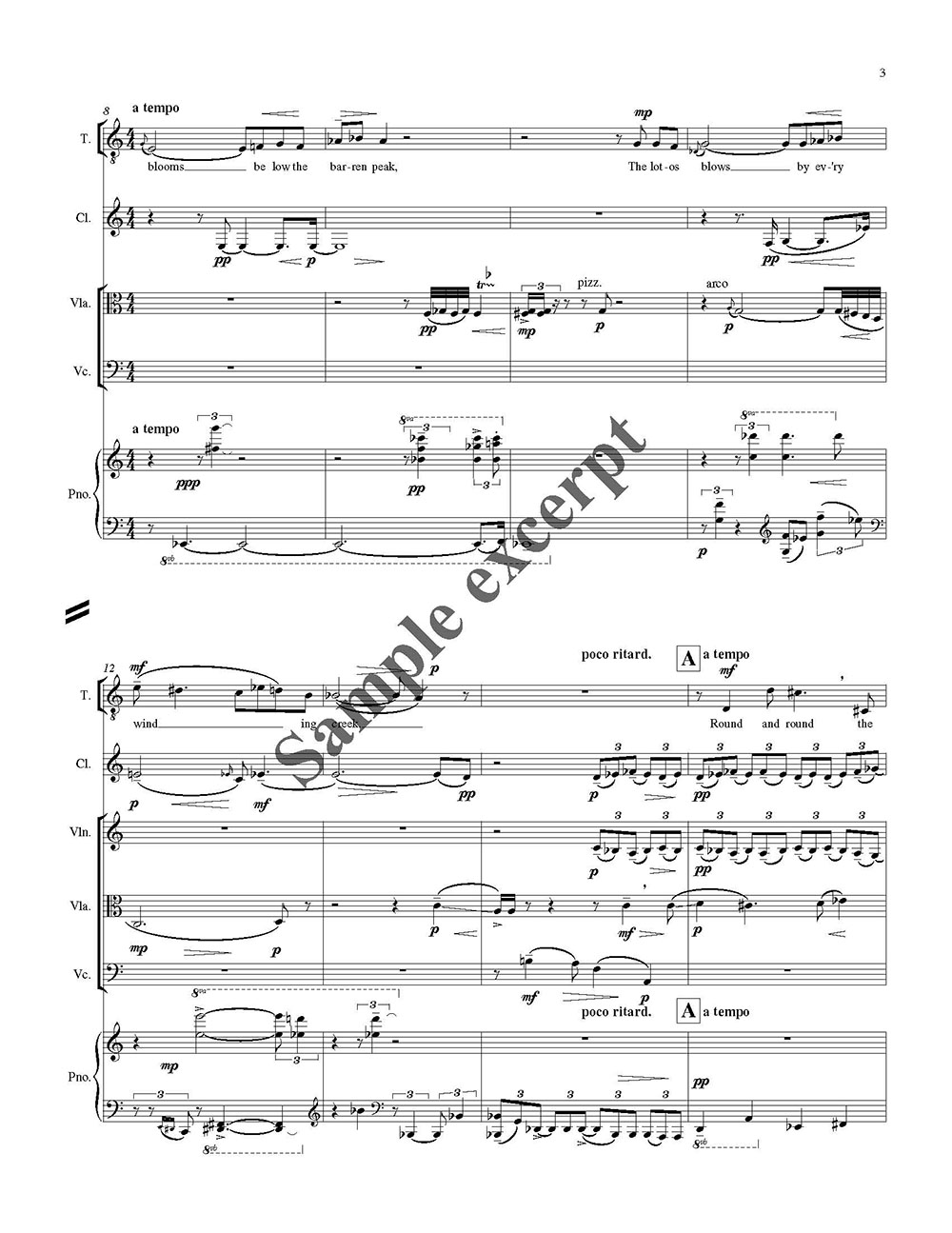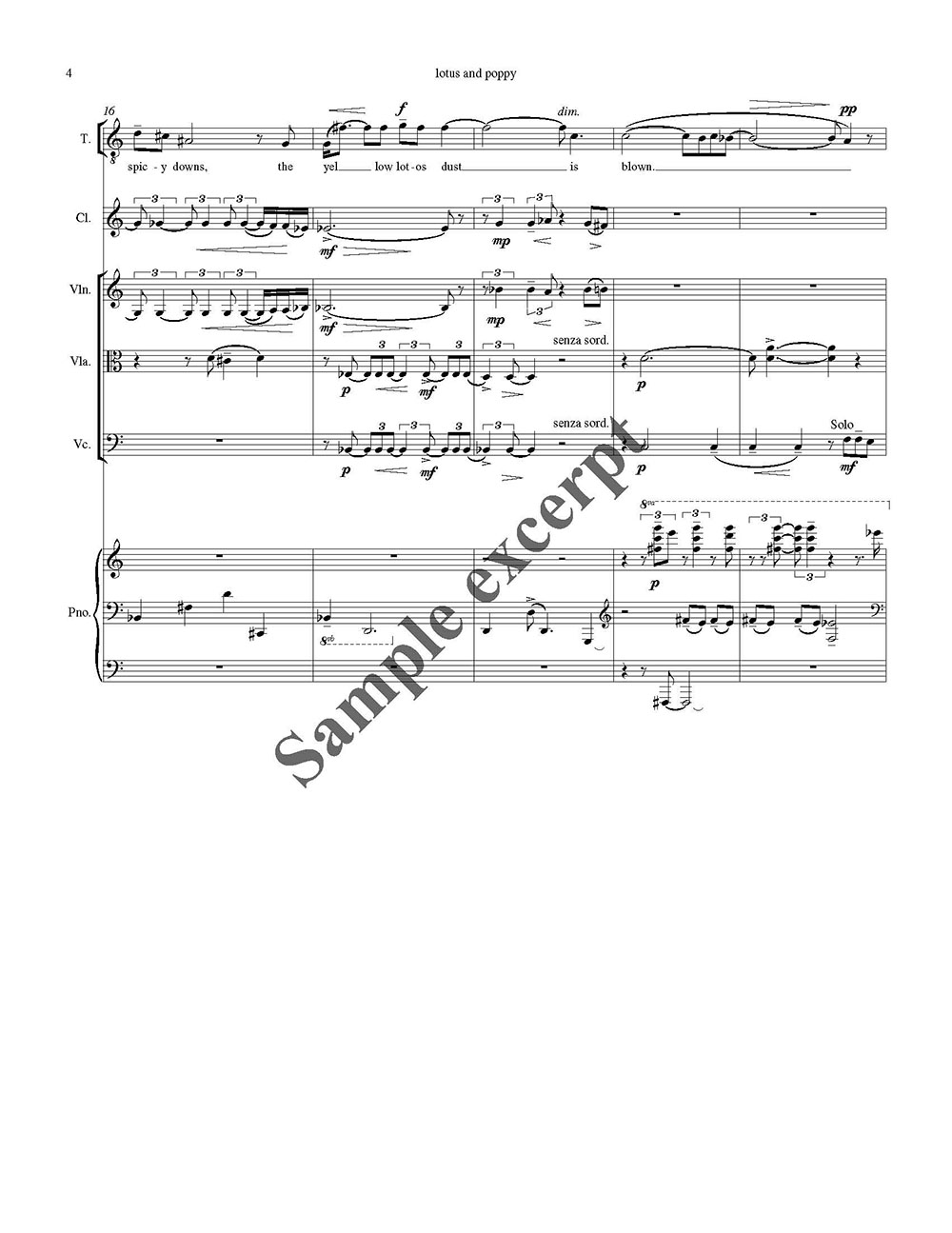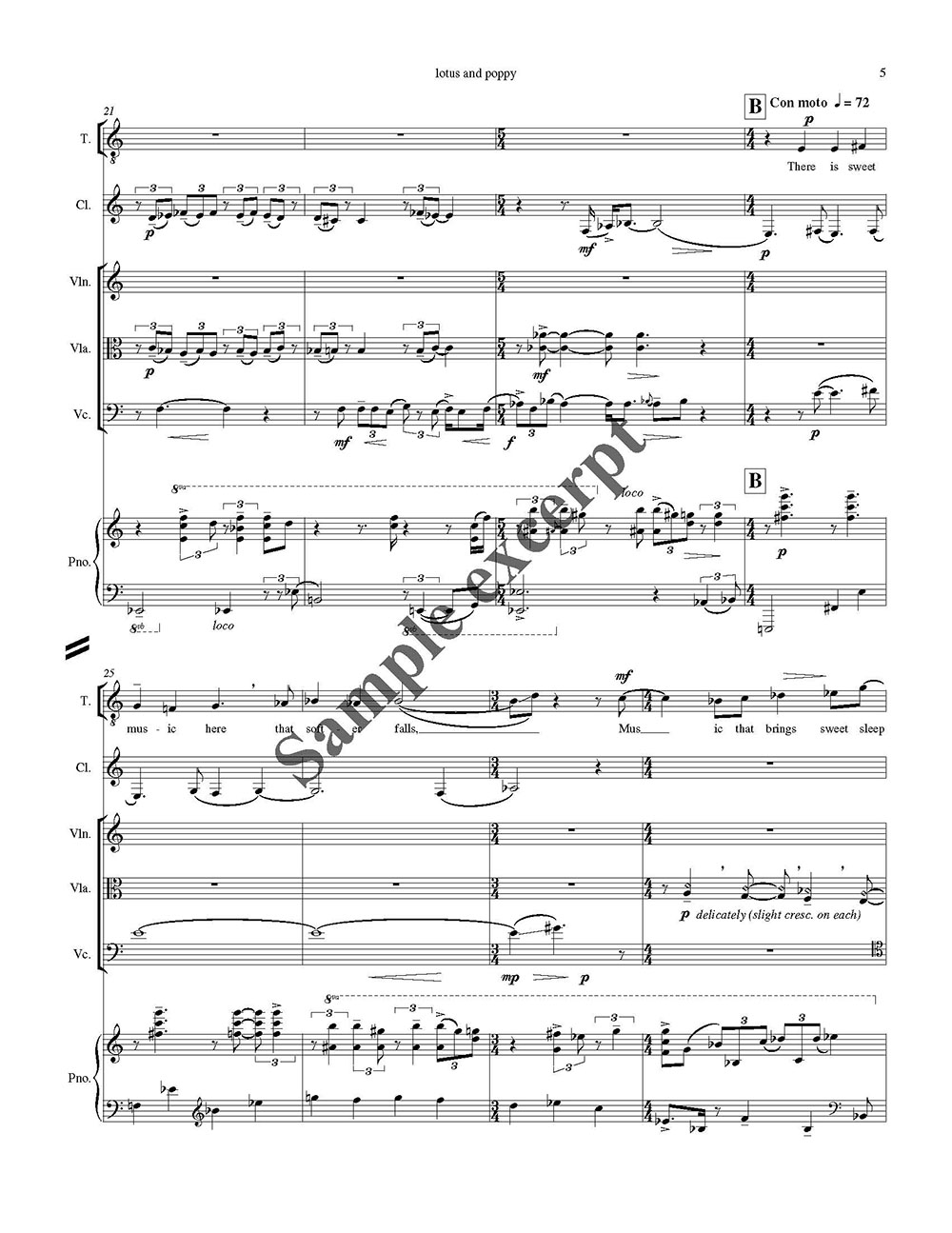lotus and poppy (2007)
for mezzo-soprano, tenor, and chamber ensemble, 11 minutes
Instrumentation
mezzo-soprano, tenor, clarinet, violin, viola, cello, piano
Premiere
Commissioned and premiered by counter)induction in New York City, 2007. A dialogue between living and dead on drug addiction, war, sleep, and withdrawing from the world.
Watch + Listen
the opium addict’s anger…
lotus and poppy, a "dramatic scene" for mezzo-soprano and tenor soloists and chamber ensemble. This is an animation made to accompany the piece by visual artist Micheline Klagsbrun, featuring her splendid images, some of which were created especially for this project.
Program Notes
Framed as a dialogue between living and dead, lotus and poppy is concerned with the themes of addiction, sleep (both physical and moral), war, the desire for withdrawal from life and the dangers of such withdrawal.
Two kinds of addiction are considered: physical addiction to opium (derived from the poppy) and a moral addiction to "lotus-eating" (a willful disengagement from the concerns of life). Both seek pleasure through removal from life’s stresses; and although similar in effect, opium addiction is physical and (eventually) involuntary, whereas lotus-eating is ethical and voluntary. If opium makes one disengaged from the world, lotus-eating is the search to disengage from the world in the first place.
Sleep is an apt metaphor for both situations. Opium makes one physically sleepy, whereas lotus-eating numbs the conscience. To "sleep through life" is a persistent theme in myth, literature, and even common parlance (as when we urge someone to "wake up" and face reality).
Both addictions - lotus and poppy - seem to originate from a primal human desire to escape the hardships and realities of existence. This desire is universally reflected in myth and story: Endymion, the Greek shepherd who sleeps forever and remains beautiful; the psalmist exclaiming, "O, that I had wings like a dove!/ For then I would fly away, and be at rest," and the lotus eaters themselves, the drowsy inhabitants of an island which Odysseus’ ships visit in Homer’s Odyssey.
Amid the myriad topics and causes worthy of attention, the concern in the present piece is the waging of unjust war, and the responsibility of citizens to resist, so far as possible, such wars. Particular American wars are referenced, but lotus and poppy considers these - including the present controversial conflict in Iraq - within the larger context of historical human warfare.
The tenor is the lotus-eater, representing all the living; the mezzo-soprano is a dead opium addict, whose release from the blindness of her life, through death, gives her delayed clarity and wisdom. The purpose of her visitation (like Marley’s to Ebenezer Scrooge) is to "wake" the living tenor from his sleep, to convince him to change course and to engage positively with the world.
Each character has distinctive music, identified with either lotus or poppy: the two types of music alternate throughout the piece. The work opens with the tenor’s "lotus music." Built on a triplet ostinato in the piano’s highest register, the lotus music is ethereal, lyrical, pianissimo, and in leisurely simple meter. The tenor’s text is Tennyson’s "The Lotos-Eaters," an eloquent and perpetually relevant rationale for moral disengagement. At the end of this initial section, agitated figurations intrude, softly at first, in the low registers of the piano and clarinet, then rapidly come to the forefront throughout the ensemble. This agitated, violent, music, in fast compound meter, fortissimo, symbolizes the "poppy" and the dead addict’s unrest. The mezzo-soprano appears to the tenor, in the midst of this music, as an angry ghost: "the dead are wakeful, for the living sleep." The mezzo describes her life’s addiction and her opium dreams, employing vivid passages from Thomas de Quincy’s autobiographical Confessions of an English Opium-Eater. Reflecting on her own failed life, the mezzo demands that the tenor not repeat her own pattern of disengagement and living sleep.
In the guise of (a somewhat compromised) prophet, the mezzo focuses on the particular topic of unjust war, and urges the tenor to engage events taking place within his own lifetime and country. She references specific wars in American history: the Civil, Mexican, Spanish-American, and Vietnam Wars, and the current war in Iraq, all of which have had, at best, mixed motivations for prosecution.
Emotional energy rises through the first part of the piece, as the mezzo attempts to convince the tenor to resist unjust war: the melodic lines of both singers become more wide-ranging and angular. The tenor clings fast to Tennyson ("What pleasure can we have to war with evil?"), although subsequent appearances of his lotus music become shorter and more uneasy (agitated triplet figurations from the poppy music intrude on the serene texture). The tenor violently rebuffs the mezzo’s prick of conscience, much as a deep sleeper might angrily shake off repeated attempts to wake him. The mezzo presses her case; as the tenor grows more stubborn in his resistance, his utterances become less varied. The lotus music disappears entirely as the scene reaches its climax, when the tenor once and for all rejects the call to action: "Let what is broken so remain!"
Resigned to this decision, the mezzo laments the tenor’s fate, and seals her verdict: "I ate the poppy in my life/But you, my brother, just as surely eat the lotus/And sleep a deeper sleep than me."
A wistful coda compares the tenor to the Cowardly Lion of L. Frank Baum’s The Wonderful Wizard of Oz, who, despite its valiant attempt to escape, had been overpowered by - and fallen asleep in - the "deadly poppy field."
The poppy, so long a symbol of forgetfulness, is also, since the First World War, a symbol of remembrance, inspired by Canadian poet John McCrae’s "In Flanders Fields."
The poppy is central to Remembrance Day observances, particularly in Canada, Australia, and the UK. It is also called "Poppy Day." The bright red flowers serve to commemorate the fallen dead of all wars, just or unjust.
lotus and poppy was commissioned by counter)induction, and is dedicated to the ensemble.
—Andrew Earle Simpson
Texts
Lotus and Poppy
"...they will not be convinced even if someone should rise from the dead."
Tenor:
The Lotos blooms below the barren peak,
The Lotos blows by every winding creek;
Round and round the spicy downs the yellow Lotos-dust is blown.
There is sweet music here that softer falls,
Music that brings sweet sleep down from the blissful skies.
Let us swear an oath, and keep it with an equal mind,
In the hollow Lotos-land to live and lie reclined
Mezzo-soprano:
The Dead are wakeful, for the Living sleep.
I drained my life by drops.
Opium, the poppy’s fruit, was my companion.
All my days and nights I slept with open eyes
I had tremendous visions, terrible visions:
I saw translucent oceans, shining like mirrors,
paved with innumerable faces - imploring, wrathful, despairing.
I was buried for a thousand years in stone coffins,
kissed with cancerous kisses by crocodiles,
I was sacrificed -
the caves of Hell sighed.
I awoke and cried aloud - "I will sleep no more!"
T:
And from the craggy ledge the poppy hangs in sleep...
Mzo:
You who live - awake!
Life has joy and opportunity,
Life has joy and comfort:
But trouble is its element.
T:
There is no joy but calm!
All things have rest; why should we toil alone?
Mzo:
Ambition, greed and gain
Direct your acts;
And wars fought for their sake
Kill off your brothers, sons, and daughters.
At Baghdad and Chapultapec and Fredericksburg
My comrades lie awake;
For those who might have stopped their deaths
Were sleeping.
T:
You come as a ghost to trouble joy!
Who are you to tell us anything? What do you know of use to us?
I will not listen to the ravings of a drug addict:
Especially a dead one.
Mzo:
In death my sleeping eyes are opened,
And I see across a great divide,
The kinds of sleep which fall upon the living:
Comfort, of acceptance, lack of trouble.
Devious slumber overtakes you all!
T:
In the hollow Lotos-land...
Mzo:
At My Lai, Fallujah, San Juan Hill,
T:
On the hills like gods together...
Mzo:
The victims of ambition lie,
T:
Careless of mankind...
Mzo:
Unable to awake their sleeping masters.
T:
Let us alone!
What pleasure can we have to war with evil?
How sweet it were, hearing the downward stream,
With half-shut eyes ever to seem
Falling asleep in a half-dream!
Mzo:
Come! Rise! You are alive! Stand up and fight the bloody minds who drive to war!
T:
Let us alone!
Is there any peace
In ever climbing up the climbing wave?
Mzo:
You sleep in life!
You let aggression take its course
And utter not a word.
Awake!
T:
What is it that will last?
Let what is broken so remain.
Surely, surely, slumber is more sweet than toil, the shore...
Mzo:
I ate the poppy in my life,
But you, my brother,
Just as surely eat the lotus,
And sleep a deeper sleep than me.
T:
Than labor in the deep mid-ocean, wind and wave and oar;
Mzo:
I can do nothing for him.
T:
the poppies blow...
Mzo:
I must leave him here to sleep on forever,
T:
row on row...
Mzo:
And perhaps he will dream that he has found courage at last.
T:
O, rest ye, brother mariners, we will not wander more.
Sources of Texts
Adapted from Alfred, Lord Tennyson, "The Lotos-Eaters"
Adapted from De Quincy, Thomas, Confessions of an English Opium-Eater
From McCrae, John, "In Flanders Fields"
Adapted from Baum, Frank L., The Wonderful Wizard of Oz ("The Deadly Poppy-Field")
Original text by Andrew Earle Simpson
